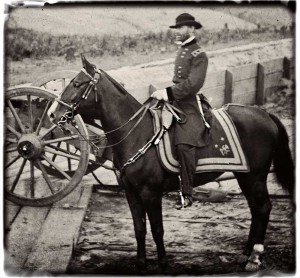Nine years after William’s birth, his 41 year old father Charles, died suddenly leaving behind a wife and eleven children with no income. There future was put directly in the hands of willing friends and family. William was adopted by a family friend, Thomas Ewing. Ewing provided the young William the necessities of life, but also the necessary financial support and guidance so sixteen year old William was admitted to West Point.
At his birth, William’s father could not have known the far reaching effects of the name he gave to his son: William Tecumseh Sherman. Tecumseh was a name that had evoked fear like an approaching plague across northern Ohio
not that many years before William’s birth. But his namesake also was an effective warrior-leader among the Shawnee. He too would become a warrior leader unlike any other ever to march across the United States of America.
On this day in 1864, William Tecumseh Sherman was living proof he had the same character as his namesake. William did not do well at West Point. He worked at several failed businesses, but finally got at an appointment to be superintendent of the Louisiana State Seminary of Learning and Military Academy in 1859.
Abraham Lincoln won the Presidential election in 1860. By the time he was sworn in to office on March 4, 1861, seven states had succeeded from the Union and elected their own president. Just a month after Lincoln’s inauguration, the war had started. On May 14, 1861, William Tecumseh Sherman was commissioned as a colonel in the U.S. Army.
Sherman would be involved in most of the major campaigns west of the Alleghenies. When Ulysses Grant was promoted to commander of all Union forces in 1864. Shortly after that Grant gave Sherman command of the Division of the Mississippi. Sherman’s mission: take complete control of the south and drive Confederate forces to the sea.

On this day in 1864, Sherman accepted the surrender of Confederate forces defending Atlanta. It would be a major accomplishment for Union forces. Atlanta was the railroad hub of the Confederacy and from where much of the war materiel went through. With its capture the South could no longer easily move men and materials where needed. It also marked the beginning of a new phase of the war.
Sherman was given the go ahead for his plan of bringing “total war” to the South. A few days ago, Atlanta citizens got a taste of what Sherman had in mind.

On September 1, 1861, a captured ammunition train was ordered destroyed. The resulting explosion caused a fire that quickly got out of hand and destroyed a large swath of Atlanta. That event was played out in a scene in the movie “Gone With the Wind.”
Sherman remained in the Atlanta area until after the election in which President Lincoln was re-elected thanks to Sherman’s success. After this pivotal point, Sherman was given permission to release the dogs of hell on his march from Atlanta to Savannah. He arrived on the coast just before Christmas leaving behind a path of destruction. There would be calls for him to replace Grant as commander of all the armies, but Sherman would have none of that and he openly